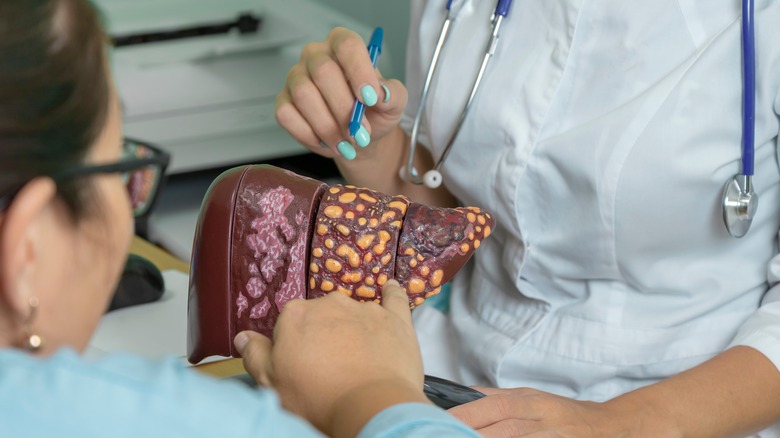What Happens To Your Body When You Have Hepatitis C
Health experts advise against sharing toothbrushes, needles, and razors for a reason: this practice can lead to hepatitis C, a viral infection of the liver. The same could happen if you have unprotected sex with someone carrying the hepatitis C virus (HCV), warns the Icahn School of Medicine at Mount Sinai. HVC can also be transmitted from mother to child during pregnancy, as well as from person to person through tattoo needles.
Approximately 80% of people infected with HCV are asymptomatic, reports the World Health Organization. Those who have symptoms may experience joint pain, nausea, cramping, fatigue, and diminished appetite. In some cases, hepatitis C may cause jaundice, fever, and changes in urine or stool color. Other common symptoms include itching, edema, drowsiness, easy bruising or bleeding, and unintentional weight loss, according to the Mayo Clinic.
This viral infection can be acute or chronic. The acute form subsides within six months, whereas chronic hepatitis C is a lifelong condition, explains the National Institute of Diabetes and Digestive and Kidney Diseases. Unfortunately, acute hepatitis C becomes chronic in 75% to 85% of cases, which may lead to serious health risks. So what happens to your body long-term when you have hepatitis C? Let's find out.
Your liver can become swollen and scarred
As mentioned earlier, hepatitis C causes liver inflammation. If you have the acute form, your liver will recover after the virus leaves your system. Chronic infections, on the other hand, cause ongoing inflammation of the liver, which may progress to scarring or fibrosis. In one-third of cases, this condition progresses to cirrhosis, or severe liver scarring, within 20 years, according to the San Francisco Department of Public Health. Another one-third of patients will develop cirrhosis over a 30-year period, but just as many people experience a slow progression of the disease, which allows them to lead a normal life.
Cirrhosis affects liver function and can lead to organ failure. Its symptoms develop over time and can include weakness, fatigue, low libido, and nausea explains the UK's National Health Service. You may also lose your appetite and eat less than usual, which can result in muscle loss. In more severe cases, cirrhosis may cause vomiting of blood, low libido, fluid buildup in the legs and stomach, dark urine, jaundice, and other complications.
While it's not possible to cure hepatitis C, you can keep it under control and prevent it from getting worse. Your doctor may prescribe antiviral drugs and lifestyle changes, such as giving up alcohol and cigarette smoking. Some patients will eventually require a liver transplant.
Some hepatitis C patients develop liver cancer
Cirrhosis is a risk factor for liver cancer, notes the Centers for Disease Prevention and Control. The odds of developing primary liver cancer, or hepatocellular carcinoma, increase by 1% to 4% per year in people with severe liver scarring. A large number of patients also experience decreased liver function, a condition associated with high mortality rates.
Hepatocellular carcinoma accounts for about 90% of all liver cancers, according to clinical evidence published in Nature Reviews Disease Primers. Researchers estimate that more than one million people will develop this condition by 2025. A staggering 80% to 90% of cases develop in patients with cirrhosis, but hepatitis B and D, heavy alcohol use, non-alcoholic fatty liver disease, and some chemicals can lead to liver cancer, too.
Treatment depends on the stage of the disease and may include liver transplantation, surgery, radiotherapy, or medications. Most patients require lifelong treatment and can experience adverse effects ranging from pain and tiredness to sexual dysfunction.
Hepatitis C can lead to neurological damage and stroke
Hepatitis C affects more than just your liver. This sneaky condition can interfere with your body's ability to flush out toxins, causing them to build up in the bloodstream. If that happens, you may experience symptoms of neurological damage, such as memory problems, confusion, personality changes, poor mental focus, and difficulty sleeping. Over time, toxin buildup can lead to speech disorders or even coma, notes Medical News Today.
Some patients with chronic hepatitis C develop brain inflammation, nerve damage, or cognitive decline. What's more, about 50% of those who contract the virus will experience fatigue, difficulty concentrating, memory lapses, and other neuropsychiatric symptoms, reports a 2017 review featured in the World Journal of Hepatology.
In the long run, chronic hepatitis C can double the odds of having a stroke and contribute to brain atrophy, according to clinical research published in Brain Sciences. There's also a risk of cognitive impairment, numbness and pain in the body's extremities, intracranial bleeding, and other complications.
You may experience digestive problems
Your liver plays a key role in digestion and energy metabolism. It produces bile, cholesterol, and certain proteins, stores glycogen, breaks down lipids, and filters toxins — among other functions, explains Johns Hopkins Medicine. Given these aspects, it's no surprise that any condition affecting the liver can interfere with digestion.
If you have chronic hepatitis C, your liver may become less efficient at producing bile, which can impair lipid digestion. Over time, this problem may lead to gut inflammation and pain or even progress to gallbladder disease, according to The Hepatitis C Trust. You might also experience nausea and vomiting, stomach pain, changes in stool color, and unwanted weight loss, says Medical News Today. In more severe cases, the disease may cause ascites or fluid buildup in the abdomen.
Even acute hepatitis C can affect digestion, causing diarrhea, cramping, and loss of appetite. Less commonly, the blood vessels in the stomach or esophagus may swell and break, leading to internal bleeding. In such cases, most patients will experience low blood pressure, heart palpitations, black or tarry stools, and vomiting of blood. If you have these symptoms, call 911 or reach out to your doctor immediately, suggests the Colorado Center for Digestive Disorders.
Your risk of developing diabetes and heart disease could go up
Chronic hepatitis C is a contributing factor to atherosclerosis and heart disease, according to 2018 research presented in the World Journal of Gastroenterology. This condition promotes plaque buildup in the arteries and triggers inflammation, leading to peripheral artery disease and other heart problems. Moreover, it affects your body's ability to metabolize glucose and lipids, which may cause insulin resistance, fatty liver disease, and type II diabetes.
A 2019 review published in the International Journal of Cardiovascular Sciences found a direct link between chronic hepatitis C, cardiomyopathies, and coronary artery disease. Researchers attribute these risks to the oxidative stress and inflammation associated with HCV infection. Another explanation is that the virus can spread throughout the body, causing carotid atherosclerotic plaques. The odds of developing heart disease are even higher in people with cirrhosis.
This viral infection can also affect your joints, muscles, and bones, as well as your kidneys and blood vessels, warns WebMD. As the disease progresses, it may lead to arthritis, kidney disease, and circulatory problems. On the positive side, early treatment can prevent complications and make it easier to manage your symptoms.
Note that hepatitis C cannot be transmitted through kissing, hugging, or sneezing, explains WebMD. Likewise, it's safe to share your food and drinks or hold hands with someone who got the virus. So, if you have a friend or family member with hep C, show your support and don't be afraid to plan things together.






